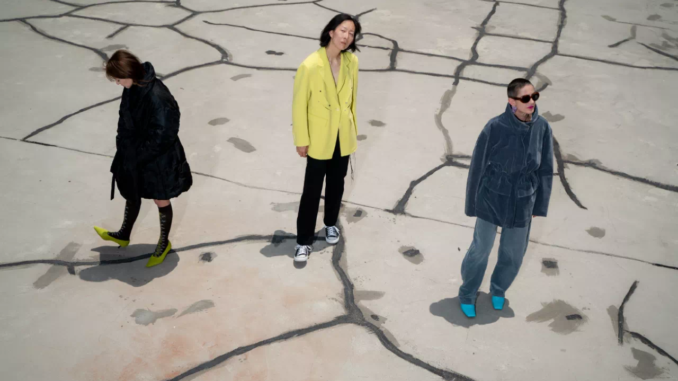
The Social Edition is our weekly series which deep dives into luxury initiatives in China’s social media landscape. Every week, we highlight brand campaigns distributed on Chinese digital platforms — WeChat, Weibo, Tmall, Douyin, and beyond.
Our coverage spotlights global luxury brands, global beauty brands, and local Chinese brands. The latter gives insight into some of China’s most successful campaigns, which often come from local players, and are outside of the beauty and fashion space.
In this week’s roundup, we look at three campaigns: from Karl Lagerfeld to L’Oreal.
Homegrown Fashion Label JNBY Taps Into Female Identity
BRAND JNBY
CATEGORY Fashion
PLATFORMS WeChat, Weibo
MEDIUM Short Film, Talk Show, Livestream Video,
OVERVIEW
JNBY, one of the most influential designer fashion brands in China, collaborated with digital media powerhouse BIE (别的) — also known as Vice China — to launch a series of videos called Persona Liberation. The digital initiative is part of the brand’s 2020 Autumn/Winter campaign and consists of three episodes, each focusing on two women. The three duos, which include artists, scholars, and celebrities, will focus on their common identities, the challenges or powers brought on by their personas, and their genuine selves. On September 19, the two entities will host a video launch with an offline talk show on this subject via a livestream on WeChat.
NETIZEN REACTION
The first episode featured the daughters of Cai Guoqiang and Xu Bing — two of the most established and internationally recognized Chinese artists — and it raked in over one million views on Weibo in one day. The co-branded WeChat post has garnered 56,200 reads thus far and has sparked many online discussions about the artists.
VERDICT
Homegrown brands have started to take cultural initiatives and focus on content production beyond selling. Though the videos do not highlight products or feature star celebrities with huge social followings, they do resonate with targeted consumers of the brand, who are quite self-aware and independent. More importantly, the digital media veteran Vice China, which has a high viewer base among young, subculture communities in the country, helps the brand attain a wider reach.
L’Oréal Promoted Anti-aging Skincare With Women Empowerment
BRAND L’Oréal Paris
CATEGORY Beauty
PLATFORMS WeChat, Weibo, Tmall
MEDIUM Short Film, Livestream
FEATURED TALENTS Zhu Yilong (26.5M Weibo followers)
OVERVIEW
To promote its Revitalift Filler Eye Cream, which has been dubbed “purple iron” in China, L’Oréal Paris collaborated with its brand ambassador Zhu Yilong on a new time-themed short film called “Time Engraver 2.” In the six-minute film, Zhu becomes a time sculptor who leaves traces of time on women’s faces and witnesses a woman who loses her wrinkles by embracing herself. The campaign also ran a livestream on Taobao Live with Zhu and the film’s director, where they shared behind-the-scenes stories.
NETIZEN REACTION
The short film scored over 9 million views in 12 hours. Aside from raving about Zhu’s acting, netizens commented on how the film was different from most campaign videos — more like a film with a great story and intriguing characters.
VERDICT
Unlike many skincare brands that tend to push stereotypical beauty standards, L’Oréal Paris decided to approach consumer aging concerns with a unique twist. The campaign doesn’t boast an instant outcome from its product; instead, it empowers women who feel anxiety about their wrinkles. It is a perfect example of how beauty brands can come up with different ways to address how Chinese female consumers feel about their looks.
Karl Lagerfeld Teamed Up with KFC to Launch Limited-Editions
BRAND Karl Lagerfeld
CATEGORY Fashion
PLATFORMS WeChat, Weibo, Tmall
MEDIUM Imagery
OVERVIEW
In celebration of the eightieth anniversary of KFC’s signature fried chicken, the fast-food brand announced a collaboration with legendary French fashion designer Karl Lagerfeld’s eponymous brand. Inspired by the design of KFC’s Big Box, the strange bedfellows will co-release limited-edition handbags and bucket hats on Tmall and host a launch event on September 4.
NETIZEN REACTION
The Weibo campaign hashtag #Keep FunChic received 5 million views, with most of the engagements being driven by KFC’s official account. Though KFC has developed successful localization strategies over the years and owns a big social following, Karl Lagerfeld’s brand awareness among Chinese netizens is still below its benchmark.
VERDICT
American fashion label Alexander Wang and McDonald’s rolled out a similar partnership last year, with the launch of their paper bag-inspired pouches and picnic baskets. According to McDonald’s, all 300 of the picnic baskets, priced at $842 (5,888 RMB), sold out in seconds. The 30,000 lunch bags ($14) were released on the McDonald’s Tmall flagship store and were sold out in 10 minutes. However, the initiative between Karl Lagerfeld and KFC hasn’t received a great response from netizens thus far, despite visuals featuring a replica of the collaboration. Crossover product launches are now a hot trend with marketers in China. But luxury brands should carefully consider whether the two parties share common identities or if they can develop a convincing product story because novelty isn’t enough anymore.

Leave a Reply